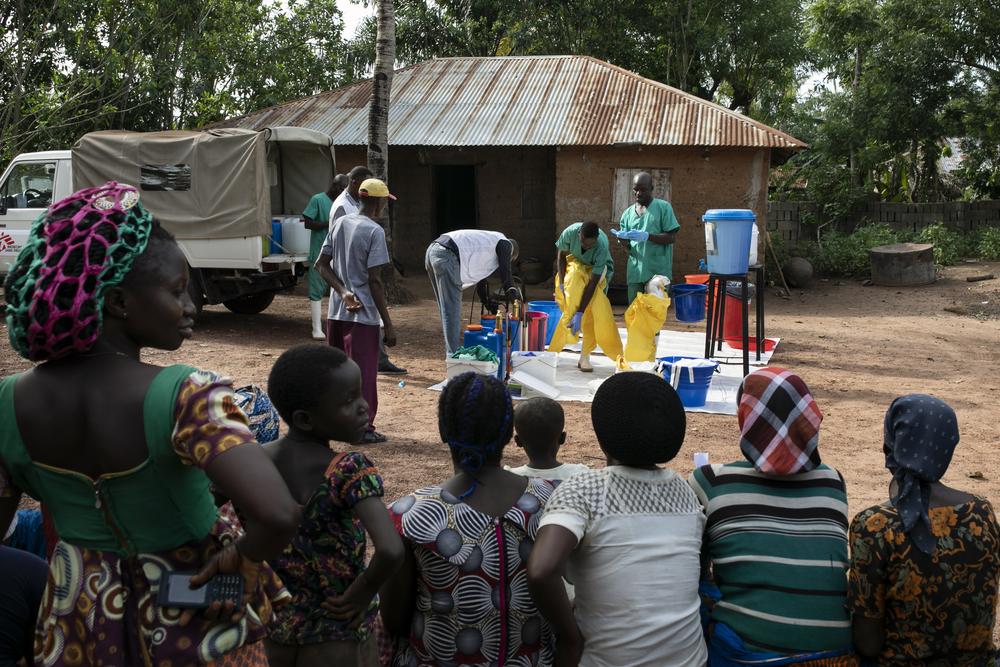On 28 April, the Nigeria Centre for Disease Control declared the 2020 Lassa fever emergency over, following a steep decline in cases. MSF recognises the efforts of our health workers, and those of the Nigerian Ministry of Health in saving the lives of patients with Lassa fever, and conducting essential research into this serious and potentially fatal disease. While the Lassa fever emergency has subsided for 2020, it remains an endemic disease; research and treatment continue to be priorities for the future.
Since 2018, MSF teams in Abakaliki have been working closely with the Ministry of Health in Abakaliki, Ebonyi state, to provide treatment for patients suffering from Lassa fever in the Alex Ekwueme Federal University Teaching Hospital Abakaliki (AE-FUTHA). Lassa fever is an acute viral haemorrhagic fever that can be passed from rodents to humans, and between people. The peak in cases is usually in January and February, and this year’s outbreak was the largest on record, with 4,914 suspected cases and 1,021 confirmed cases across 27 Nigerian states.
In 2018, 16 people in Ebonyi state tragically lost their lives to Lassa fever, among them eight healthcare workers – the toll the disease was taking prompted MSF to begin responding in Abakaliki. However, in 2019, despite six health workers falling sick with the disease, they all recovered; and so far in 2020, not a single health worker has contracted Lassa fever in Ebonyi.
The protection of healthcare workers represents a substantial step forward in screening, testing and treating Lassa fever in the state. In 2018, this was one of the primary goals established between MSF and the Ministry of Health. By protecting healthcare workers, more patients can be treated, and hospitals do not become amplifiers of the virus.
The protection of healthcare workers, as well as other patients and hospital staff, was achieved through infection control protocols, personal protective equipment and adapted patient flow and triage systems. These protocols have been used effectively by MSF and Ministry of Health teams in treating patients for Lassa fever, and similar protocols are now being implemented in an Ebonyi state isolation ward for patients with COVID-19.
However, despite the effective treatment of 81 patients with Lassa fever this year in AE-FUTHA, there are still substantial barriers to care for many patients. Even today, there is no access to pre-qualified drugs to treat Lassa fever, and the most commonly used drug in treatment, Ribavirine, has yet to pass a randomised controlled trial testing. With this in mind, MSF’s intervention in Abakaliki has a research, as well as a treatment component, with the aim of producing more effective clinical diagnoses and treatment methods for Lassa fever.
Treatment for patients with Lassa fever is far more effective in the early stages of the disease. However, two further barriers also prevent patients from coming forward for essential care: the prohibitive cost of treatment, and the associated stigma.
While healthcare for all MSF patients is free of charge, more generally, treatment for Lassa fever and particularly supportive treatment including dialysis, is remarkably expensive. For the average course of treatment, lasting approximately 15 days, patients can expect to pay 60,000 Naira. This means that for some, treatment simply isn’t an option.
Nnenna Nnachi and April Odeke, part of a team of MSF Health Promotors, raise awareness about Lassa fever in the Mother and Child Hospital Azuiyiokwu, in Abakaliki. They explain to pregnant women how to avoid getting infected with Lassa fever, and what to do if someone falls sick. © Albert Masias/MSF
In terms of Stigma, MSF teams in Abakaliki have seen first-hand the effect of misinformation on the physical and psychological well-being of our patients and their loved ones. Through the stigma associated with Lassa fever patients, survivors and even health staff have faced social exclusion from workplaces, schools, places of worship and even their own communities. While MSF health promotion teams dedicate their time to providing accurate information about the treatment and transmission of Lassa fever, it’s important to recognise that with the proper protocols, transmission can be prevented, and with early reporting – patients can be treated effectively.
MSF’s Head of Mission in Nigeria, Laura Martinelli stressed the importance of working closely with communities for better trust and understanding in the response:
“The announcement in April from the NCDC that the 2020 Lassa fever emergency has subsided offers a ray of hope for health workers and patients who have been battling the disease. It is by working closely and engaging with communities in Ebonyi state, as well as the Ministry of Health, that we have made steps forward in the treatment of Lassa fever. However, there is still much to be done for the years ahead, and MSF remains committed to treating and researching Lassa fever in Nigeria.”
Now that the number of Lassa fever cases has diminished for 2020, MSF’s medical teams in Abakaliki have turned their attention to supporting the Ministry of Health in managing the COVID-19 pandemic. After working with Ministry of Health teams to establish a COVID-19 isolation facility, MSF is now supporting the Ministry of Health in Ebonyi with resources including personal protective equipment and human resources.
